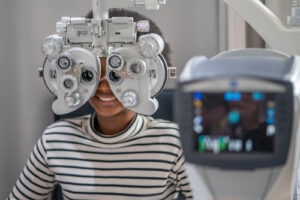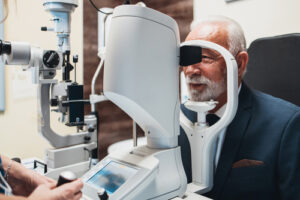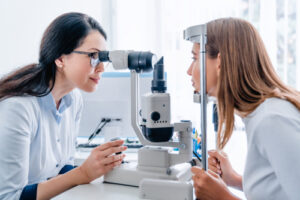Are you feeling nervous before your next eye exam? If you haven’t seen an eye doctor in a long time, it’s common to be uncomfortable.
But there’s no reason to feel nervous, even if it’s been years since your last eye exam! The most important thing you can do for healthy eyes is to see an eye doctor regularly.
Many people put off seeing the eye doctor, especially those that don’t have refractive errors and don’t need an updated prescription. But no matter who you are, you need to see the eye doctor at least every two years.
You only get one set of eyes, so making them a priority is a must. While you’re seeing your eye doctor, they can answer any questions you may have about how to keep them healthy, no matter what age you are.
Not sure what to ask? Keep reading for some of the most common questions you can ask your eye doctor!
Feel free to ask for more details as you need them, and make sure to bring up any other concerns you may have.
Why Do I Need Regular Eye Exams?

Even if you aren’t experiencing any issues with your eyesight, you should see the eye doctor regularly. Just like how you should have an annual physical from a physician to ensure you’re healthy, you need to have your eyes examined to ensure nothing is wrong.
Some eye conditions, prevalent age-related conditions in adults over 40, don’t present symptoms in the early stages. Not only that, but when they do start to cause vision loss, it’s irreversible.
The only way to effectively treat these conditions to prevent vision loss is to diagnose them early. That’s why eye exams are essential as you get older.
How Often Should I Have an Eye Exam?
How often you should have an eye exam depends on how old you are and whether or not you’re at an increased risk for developing an eye condition. If you’re an adult between 18 and 40 and don’t require glasses or contact lens prescriptions, you should still see an eye doctor every two to three years.

Once you turn 40, you should see your doctor every other year. By the time you’re 60, you should be going to the eye doctor every year.
If you’re at higher risk for an eye condition due to a pre-existing condition or family history, you may need to have eye exams more often. Talk to your eye doctor about your specific needs based on your medical history. If you require a prescription for glasses or contacts, you should have an eye exam every year, no matter how old you are.
Children also need eye exams. Your child’s pediatrician will usually be able to tell you when your child needs to start seeing the eye doctor. Feel free to ask them or your eye doctor if you have any concerns.
What is the Difference Between an Optometrist and an Ophthalmologist?

Optometrists and ophthalmologists are both eye care specialists. The main difference is that an ophthalmologist has a medical degree and can treat eye conditions and perform surgery like LASIK or cataract surgery.
An optometrist doesn’t have a degree from medical school, but they do go through optometry school and are qualified to assess your vision and prescribe glasses or contact lenses. They can also screen for medical conditions, although they will refer you to an ophthalmologist if you require treatment.
You can have an eye exam that an optometrist performs. But if you end up having any persistent eye conditions that require monitoring and treatment, you may need to see an ophthalmologist regularly.
Why Are My Eyes Dry?

Dry eyes are a prevalent problem that affects people around the world. Sometimes, your eyes can get dry due to dehydration, being in a dry environment, contact lenses, and eye strain.
Typically, you can relieve your dry eyes by changing your environment and using over-the-counter artificial tears. But sometimes, dry eye isn’t temporary.
You may have dry eye syndrome or chronic dry eye. This condition is more common in older adults and women, especially pregnant women and menopausal women. However, anyone can develop dry eye syndrome.
Your eye doctor can recommend many non-invasive treatments for dry eye syndrome, including taking certain nutritional supplements, making minor changes to your environment, and drinking more water. In severe cases, some therapies and surgeries may help.
If your eyes are frequently dry, tell your eye doctor so they can assess the cause and determine if you have dry eye syndrome. For many people with dry eye syndrome, it can take a combination of lifestyle changes and medications to find relief from their symptoms.
How Bad is Using Electronics for My Eyes?

Frequent screen time can harm your eyes. Screens emit blue light, which can cause Computer Vision Syndrome or CVS.
The symptoms of CVS include eye strain, dry eyes, headache, and fatigue. Luckily, CVS is treatable. You can rest your eyes and use artificial tears and eye drops.
But you don’t need to stop working on the computer altogether if you use one for your job. Follow the 20-20-20 rule.
Every twenty minutes you spend in front of a screen, take a twenty-second break to look at an object twenty feet away. It’s a simple way to give your eyes a break to blink and remoisturize so they won’t be as strained. Making this small change can make a big difference!
Why is Wearing Sunglasses Important?

UV damage can cause severe damage to your eyes. In the short term, it can make them dry and cause discomfort.
In the long term, it puts you at higher risk for eye conditions, including cancer, age-related macular degeneration, and earlier development of cataracts. Sunglasses are the best defense against UV rays that the sun emits.
Be sure whatever sunglasses you use are marked with a sticker or tag that says they block out 100% of UV rays. If they don’t, buy a better pair to ensure you receive the protection you need!
Ready to make your eyes a priority? Schedule your appointment at South Texas Eye Institute in San Antonio, TX, today!

